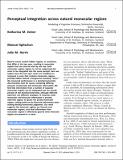Perceptual integration across natural monocular regions
Abstract
Natural scenes contain hidden regions, or occlusions, that differ in the two eyes, resulting in monocular regions that can only be seen by one eye. Such monocular regions appear to not be suppressed but seem to be integrated into the scene percept. Here we explore how the two eyes' views are combined to represent a scene that contains monocular regions, partially hidden behind a foreground occluding “fence.” We measured performance in a density/numerosity discrimination task for scenes containing differing amounts of binocular and monocular information. We find that information from a number of separate monocular regions can be integrated into our overall percept of dot density/numerosity, although different observers use different strategies. If, however, both monocular and binocular information is present, observers appear to ignore the purely monocular regions, relying solely on the binocular information when making density/numerosity judgments. Our work suggests that binocular regions are favored over monocular regions, such that information from monocular regions is effectively ignored when binocular regions are present in a scene.
Citation
Zeiner , K M , Spitschan , M & Harris , J 2014 , ' Perceptual integration across natural monocular regions ' , Journal of Vision , vol. 14 , no. 3 , 5 . https://doi.org/10.1167/14.3.5
Publication
Journal of Vision
Status
Peer reviewed
ISSN
1534-7362Type
Journal article
Rights
Copyright 2014, ARVO. This is open access article.
Collections
Items in the St Andrews Research Repository are protected by copyright, with all rights reserved, unless otherwise indicated.

